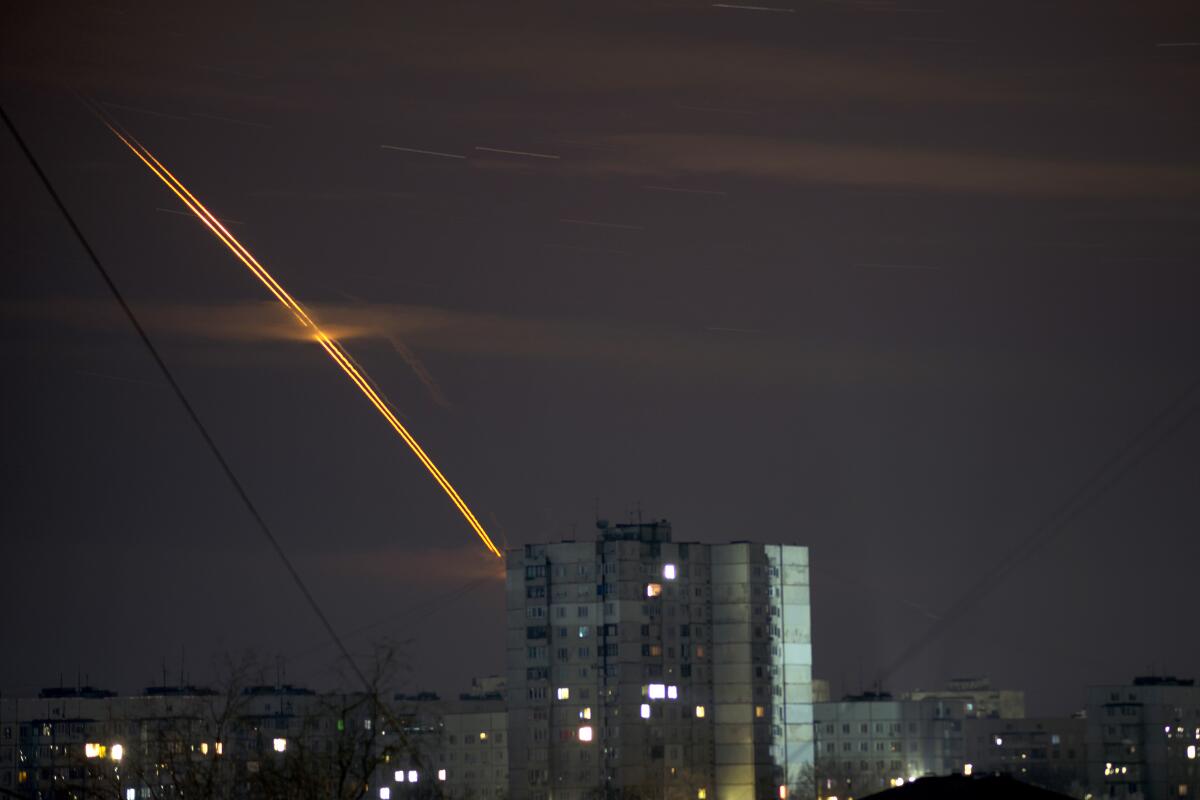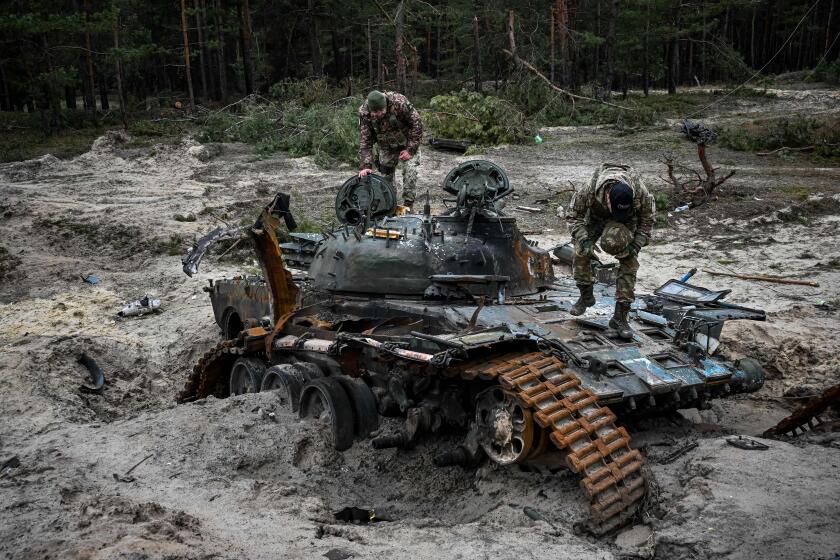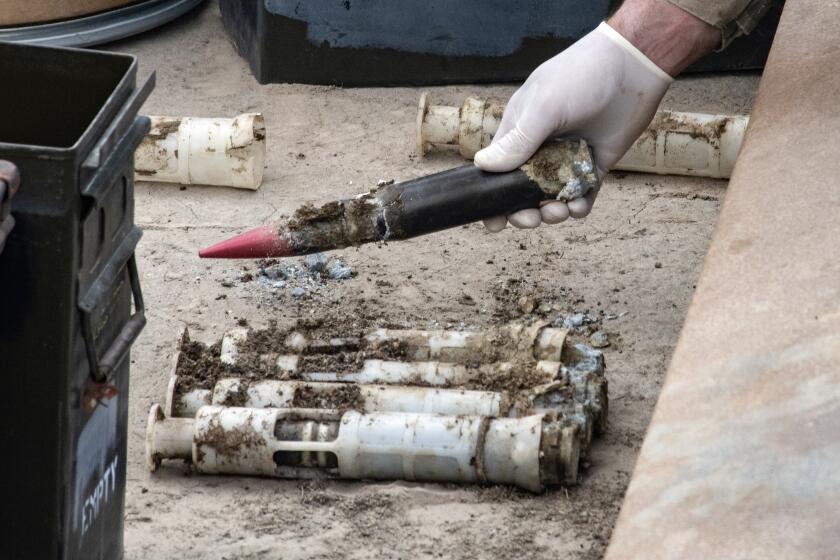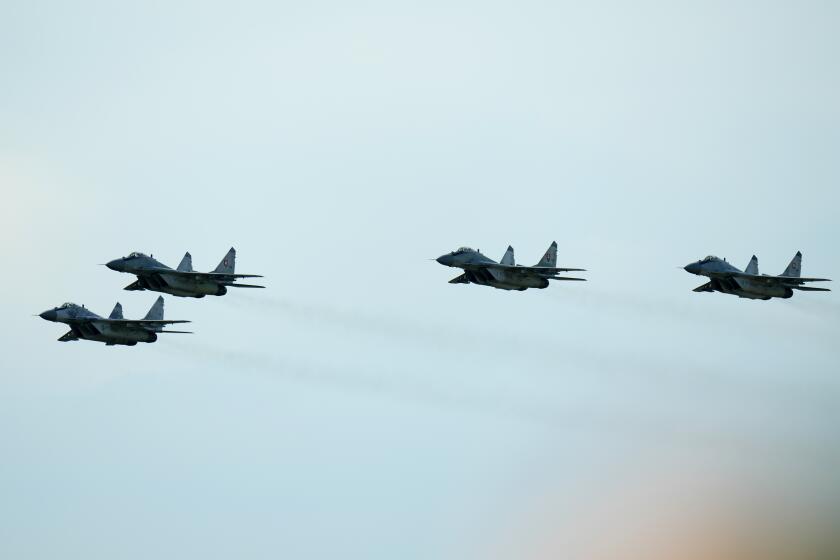Russian long-range strikes kill 10 civilians, wound 20 others across Ukraine

- Share via
KYIV, Ukraine — Russian long-range strikes killed at least 10 civilians and wounded 20 others in several areas of Ukraine on Friday, Ukraine’s presidential office said, as a senior Kremlin official warned that Moscow’s forces were prepared for an expected counteroffensive in the coming weeks.
Five people died in Kostiantynivka, a town in eastern Ukraine’s Donetsk province, when a Russian missile hit an aid station. Ukrainian authorities last year had established hundreds of so-called points of invincibility where residents hard-pressed by the war could warm up, charge their cellphones and get snacks.
Local prosecutors said the Russians attacked Kostiantynivka with S-300 antiaircraft missiles. The civilians who died were refugees, according to Donetsk Gov. Pavlo Kyrylenko.
As the mostly artillery war of the recent winter months stretched into spring, Russian forces also used air-launched missiles, exploding drones and gliding bombs in their attacks on several regions early Friday, Ukrainian air force spokesman Yurii Ihnat said.
Two civilians were killed and nine were wounded in the Sumy provincial town of Bilopillia by a nighttime rocket and artillery barrage and airstrikes, the administration of the northeast region said.
In the southern Kherson region, which Ukrainian President Volodymyr Zelensky visited Thursday, Russian shelling killed one person in the main city, also called Kherson, and killed another person and wounded four others in the town of Bilozerka.
The Ukrainian military’s surrender hotline, dubbed ‘I Want to Live,’ is enticing some Russian soldiers to quit the battlefield as the war drags on.
On Wednesday, a Russian drone attack struck a high school and dormitories south of Kyiv, killing at least nine people.
Kyiv’s forces are poised to use the improved spring weather and the arrival of modern weapons supplied by its Western allies, including tanks, to launch a counteroffensive aimed at dislodging Russian troops from occupied areas of Ukraine.
Dmitry Medvedev, Russia’s former president and now the deputy head of its Security Council, said the Russian military was ready to repel a counterattack.
“Our General Staff is assessing all that,” Medvedev said.
Russia has issued a sharp warning that the West risks further escalation after the U.K. said it would supply Ukraine with uranium-based ammunition.
He also said that a Ukrainian attempt to seize Crimea, which Russia illegally annexed in 2014, could trigger a nuclear response from Moscow.
“An attempt to split part of the state away means an encroachment at the very existence of the state,” he said. “Quite obviously, it warrants the use of any weapons. I hope our ‘friends’ across the ocean realize that.”
Although he is known for his bombastic pronouncements, Medvedev’s warning stems from the Russian security doctrine that envisages the use of nuclear weapons in response to a nuclear attack or an attack with conventional weapons that threatens “the very existence of the Russian state.”
Medvedev also said that Western experts operating weapons, such as the U.S.-made Patriot air-defense missile systems supplied to Ukraine, would be legitimate targets for the Russian military.
Ukrainian soldiers have received training in the U.S., although Russian officials have frequently claimed that foreign instructors are present in Ukraine.
Slovakia says the first four of 13 Soviet-era MiG-29 fighter jets that it decided to give Ukraine have been safely handed over to Kyiv’s air force.
“If Patriot or other weapons are delivered to the territory of Ukraine along with foreign experts, they certainly make legitimate targets, which must be destroyed,” Medvedev told reporters in video clips he posted on his messaging app channel. “They are combatants, they are the enemies of our state and they must be destroyed.
“They must understand that as soon as an American or a Polish soldier shows up there, he must be killed,” he added.
The Kremlin’s goal is to “create a sanitary cordon” of up to 60 miles around Russian-held areas so that short- and midrange weapons can’t strike them,
Medvedev said.
Moscow may even set its sights on grabbing a bigger chunk of Ukrainian territory, stretching all the way to the border with Poland, he said.
More to Read
Sign up for Essential California
The most important California stories and recommendations in your inbox every morning.
You may occasionally receive promotional content from the Los Angeles Times.













